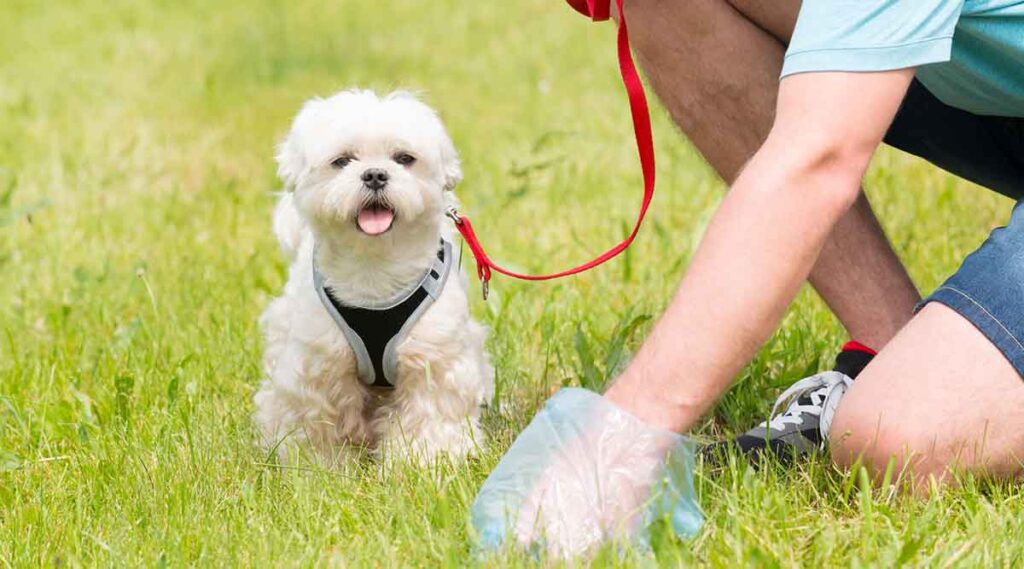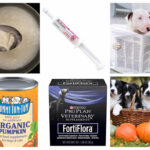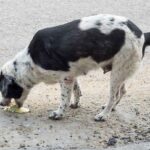
This article was updated on December 14th, 2023

In my clinic, I see dogs suffering from diarrhea on a daily basis; some have no other signs of illness, and others are clearly very sick. In this article, we will discuss 6 things to know if your dog has diarrhea – but acts normal and appears to be completely fine.
6 Things to Know If Your Dog Has Diarrhea But Is Otherwise Acting Normal
1. Usually, there is no reason to worry.
“It is common for a dog with diarrhea to be acting completely normal, with no other signs or symptoms. This largely depends on whether the cause of the diarrhea is affecting body systems other than the gastrointestinal tract.”
Often, if the dog only has diarrhea and is feeling well, the cause is limited to the gastrointestinal tract.
However, if whatever is causing diarrhea enters the bloodstream or if other organs are affected, a dog will generally feel unwell and often show other signs, such as vomiting or lethargy.
2. In most cases, the diarrhea will clear up within 1-4 days.
Diarrhea in dogs typically goes away on its own in just a few days, with no need for any special treatment.
“The speed of recovery will depend on the underlying cause. If your dog has a food intolerance, then you may see an immediate improvement once you switch to a bland diet. However, if your dog is suffering from a parasitic infection, it can take a couple of weeks for symptoms to fully resolve after anti-parasitic treatment.”
In most cases, your dog’s diarrhea will clear up within 4 days. If the diarrhea hasn’t cleared up after a few days, read our article about dogs having diarrhea for several days.
3. Try adjusting your dog’s diet.
“Although most cases of dog diarrhea go away on their own in a few days, changing your dog’s diet can help resolve it faster. I have listed below a few diet changes I recommend to help stop your dog’s diarrhea as fast as possible”
- Bland diets. Plain chicken, rice, pumpkin, and white fish are all bland, easily digestible foods that shouldn’t cause any further harm to your dog’s gut. Note that some articles recommend fasting. While fasting might give your dog’s gut a break, there is no research that suggests it is beneficial. You are better off feeding your dog a bland diet.
- Smaller portions. Feed your dog small amounts and often to avoid overloading their gut.
- Pro-biotics. Probiotics are a great way to restore the normal bacterial balance in your dog’s gut. These products or supplements contain healthy bacteria that are essential for recovery.
“If one of my dogs has more than one episode of diarrhea, I bring in the probiotics. I give these probiotics for a couple of days. If the diarrhea continues and they are still eating, I start feeding a bland diet of chicken and rice in small amounts 3-4 times a day. If the diarrhea lasts longer than 3-4 days or if their signs get more severe, it’s time for a workup.”
Other options to help your dog recover includes:
- Veterinary gastrointestinal diets. The best thing that you can feed a dog with diarrhea is a specifically formulated dog food for gastrointestinal problems, these are gentle and easy to digest, but still provide all of the nutrients they need for recovery.
- Binders. Binding paste is a useful food supplement that is high in fiber to help bulk up your dog’s stools again.
Learn more about these home remedies: Remedies to Stop Your Dog’s Diarrhea Fast
4. Make sure your dog drinks lots of water and gets plenty of rest.
Your dog will be losing a lot of fluids in their watery poop, so it’s vital to keep them well hydrated. Make sure there is plenty of fresh water available and mix extra water into their food. Diarrhea that is left unchecked can lead to dehydration and malnutrition.
Similarly, let your dog rest as they need to conserve energy for recovery. Tone down their level of exercise for a few days until the diarrhea has stopped.
5. The most common causes include dietary intolerance and parasites.
The most common causes of diarrhea for a dog that is otherwise acting normal include dietary intolerance and parasite infection.
1. Dietary intolerance: A reaction or allergy to something in the food will result in inflammation of the lining of the intestines over time. This reduces the ability of the intestines to absorb nutrients and water, resulting in watery stools.
This study shows that 42% of dogs with diarrhea responded positively to a change in their diet. Therefore, if your dog has a dietary intolerance, you can try feeding your dog a bland diet, in smaller portions, with a probiotics supplement, for 5 days.
2. Parasite infection: the college of veterinary medicine at Kansas State estimates that 34% of dogs have gastrointestinal parasites. Parasitic disease of the gut with worms or protozoan parasites will result in inflammation and therefore diarrhea. Your dog may or may not show other signs of illness.
The best way to find out if your dog has a parasite infection is to look for the presence of worms in their stools or have your vet analyse a stool sample. Parasite infections are generally treated with anti-parasite medication available from your vet.
Both of these conditions are generally confined to the gastrointestinal system and have little effect on the rest of your dog’s health unless they are left unchecked for long periods of time.
6. You should see a vet if your dog has persistent diarrhea (3+ days), discolored stool, or frequent vomiting.
While the most sinister causes of diarrhea will often also result in your dog being unwell or displaying other symptoms, there are some situations that shouldn’t be ignored even if your dog is acting normal:
Persistent diarrhea (more than 3 to 14 days)
“If the diarrhea is chronic in nature, it suggests that whatever is causing the stools to be soft has been present for a while. Causes of chronic diarrhea include dietary allergies, inflammatory bowel disease, and cancer. Over time, these conditions can worsen resulting in chronic inflammation of the intestines, reduced nutrient absorption, weight loss, and other symptoms.”
Your dog may appear to be feeling well if these are to blame for the diarrhea, but they should not be ignored. While your dog may appear fine overall, it doesn’t guarantee that the issue is not serious. Some dogs are excellent at masking their discomfort or illness.
“Penny was one such dog that presented to my clinic with multiple episodes of very watery diarrhea. For all intents and purposes, she was bright and alert and eating normally. Because of this, the owner hadn’t thought much of it. However, she had been gradually losing weight. After not responding to usual treatments, tests revealed that she had inflammatory bowel disease. She was started on anti-inflammatory medication, and the diarrhea stopped almost immediately. She began to gain weight again.”
Discolored stools (in addition to the diarrhea)
Bright yellow-colored stools may be an indication of an underlying liver condition and blood in the stools may indicate severe damage and inflammation to the intestinal walls. If your dog has bright yellow or orange stools but acts normal, it may not necessarily be a cause for immediate concern. However, it’s important to monitor the situation and consider a couple of factors:
Frequency and Duration: If it’s a one-time occurrence, and your dog is otherwise acting fine with no other abnormal symptoms, it may not require immediate veterinary attention. However, if the bright yellow or orange stools persist for more than 48 hours or occur repeatedly, it’s advisable to consult with your veterinarian.
Additional Symptoms: While your dog may be acting normal, it’s essential to watch for other signs of illness such as vomiting, loss of appetite, lethargy, abdominal pain, or changes in behavior. If these symptoms accompany the bright yellow or orange stools, it’s recommended to reach out to your veterinarian.
It’s always better to err on the side of caution and contact your veterinarian if you have concerns about your dog’s bright yellow or orange stools, especially if they persist for more than a day or are accompanied by other alarming symptoms.
Frequent vomiting
“If your dog is experiencing both vomiting and diarrhea while still acting normal overall, it could indicate a variety of potential causes. These include mild gastrointestinal infections, parasitic infection or stress. All of these not only lead to loose stools but can result in your dog feeling a bit nauseous, resulting in vomiting.”
However, vomiting is generally considered a more concerning symptom than diarrhea; while a one-off bout of vomiting may not be any reason to worry, dogs that have multiple vomiting episodes within a 24-hour period should see their veterinarian.
Is Diarrhea Ever An Emergency (When My Dog Seems Fine)?
It is unlikely that your dog will require emergency veterinary intervention if their only sign of illness is diarrhea – and your dog is otherwise acting normal (with no other symptoms).

However, innocent diarrhea can progress to a more severe condition if left unchecked. Prolonged diarrhea can lead to dehydration which may warrant emergency fluid therapy, and blood in the stool might indicate a compromise in the lining of the gut, leaving it susceptible to infection (read the article from our emergency veterinarian: When is Diarrhea in Dogs an Emergency?).
If your dog develops diarrhea in the middle of the night but is otherwise well then it is usually safe to wait until morning to assess the situation: read our article about dogs with diarrhea at night & what to do. If the condition persists and your dog has other signs of not feeling well, a visit to their veterinarian is needed.
Important Things to Consider When Your Dog Has Diarrhea
Whether your dog is well in themselves or not, the nature of their diarrhea can give a lot of clues as to what the cause may be:
Color:
- Orange/yellow colored diarrhea may be due to the make-up of your dog’s diet, it can indicate liver disease, or it may simply mean that the stool has passed too quickly through the intestines to absorb the usual bilirubin pigment that gives poop its normal brown color.
- Green-colored stools often indicate your dog has eaten too much grass recently but could also indicate the presence of parasitic disease.
- Very dark or black stools may indicate the presence of digested blood in the feces and therefore bleeding somewhere higher up in the gastrointestinal tract.
- Red-colored poop often indicates the presence of fresh blood and therefore bleeding lower down in the gastrointestinal tract.
- Grey-colored diarrhea often indicates the presence of excessive fat in the stool, this may be due to a fatty diet or a failure to digest fats properly.
- White specks in your dog’s poop will often indicate a parasitic worm infection.
Consistency:
Feces are often scored from 1-7 based on how well-formed the stools are. A score of 7 would indicate a completely watery consistency and an issue with the reabsorption of water in the large intestine. Stools can vary from very watery, to loose, to very firm.
Some stools may also have a mixed consistency, sometimes starting firm and becoming softer towards the end. The stool may also appear to have some mucousy coating on it, this is not normal and can often indicate some degree of large bowel disease.
What is the Ideal Size, Shape, and Color of a Dog Stool?
While there is no ‘one stool fits all’ rule when it comes to poop, since dogs are all on different diets and have different digestive capabilities, there are some general attributes than mean your dog has healthy stools.
The ideal stool should be brown-chocolate in color, a slightly moist consistency that holds its shape when picked up, and should have an elongated rounded shape.
FAQ About Dog Diarrhea with Dr. Alex Crow
How Long Does Diarrhea Typically Last with Dogs?
How long your dog will have diarrhea will depend on the underlying cause and what treatment they are on. If the diarrhea is due to a dietary intolerance, then it can be 4-6 weeks until they are used to the new diet. If they have diarrhea due to eating something rotten, then diarrhea generally lasts 3-4 days.
Can I Use Imodium To Treat My Dog’s Diarrhea?
While Imodium can be useful in the treatment of some cases of diarrhea, there are some cases such as infectious diarrhea, or if your dog has any other underlying health condition, that means Imodium should be avoided. If your dog is a herding breed such as a Collie or an Australian Shephard, then you should also avoid Imodium as these breeds of dog have the potential to have a reduced ability to metabolize Imodium. Always check with your veterinarian before administering “home remedies.”
Can I Use Pepto Bismol to Treat My Dog’s Diarrhea?
Pepto Bismol is not safe to give at home to dogs. The main reason is that Pepto Bismol contains subsalicylate which is a form of aspirin. It also will cause black-colored stool due to the bismuth in this medication, thus masking any gastric bleeding that may be occurring within your dog’s stomach. Pepto also interferes with the appearance of the intestines on radiographs and can cause accidental misdiagnosis. Generally, it is best to avoid giving any medication to your dog without first consulting your veterinarian.
What’s the Cost of Procedures if I go to the Vet for Dog Diarrhea?
The cost of treating a dog with diarrhea can vary greatly depending on the severity of the condition and the underlying cause. A simple case of dietary intolerance might cost between $30-50 to treat whereas more serious conditions that require investigations will cost more. Worm or parasite infestation might cost between $150-300, inflammatory bowel disease might cost between $500-1500.
What if My Dog has Diarrhea and Other Symptoms?
If your dog has diarrhea and is also unwell in themselves and/or is showing other signs of illness, then there may be a more serious condition to blame. The most common of these conditions are:
- Bacterial or viral gut infection
- Liver disease
- Gastrointestinal cancer
- Pancreatitis
- Exocrine pancreatic insufficiency
- Hemorrhagic gastroenteritis
What if my dog is also vomiting?
While there are many causes of vomiting, this usually indicates that whatever has caused diarrhea has also entered the bloodstream or there is a physical obstruction within the stomach. You should take your dog to the veterinarian. Read our article to help a dog who vomits and has diarrhea.
What if my Dog has Bloody Diarrhea?
Bloody diarrhea means that the lining of the intestines is damaged and bleeding into the stools is occurring. Any inflammatory cause of diarrhea can result in bloody stools and although usually only small amounts of blood are lost, if serious enough it can be fatal. You should take your dog to the vet. Learn more.
What if my Dog has Mucus in the Diarrhea?
Mucus in dog poop or in diarrhea indicates a large intestinal problem. If your dog feels well, and they have a small amount of mucus in the stool, then it may not be much to worry about. However, if they are unwell, then they should see the vet.
Related posts:
Disclaimer: This website's content is not a substitute for veterinary care. Always consult with your veterinarian for healthcare decisions. Read More.


















Be the first to comment